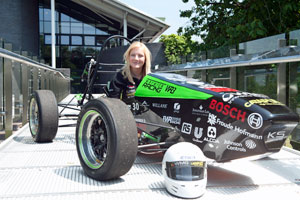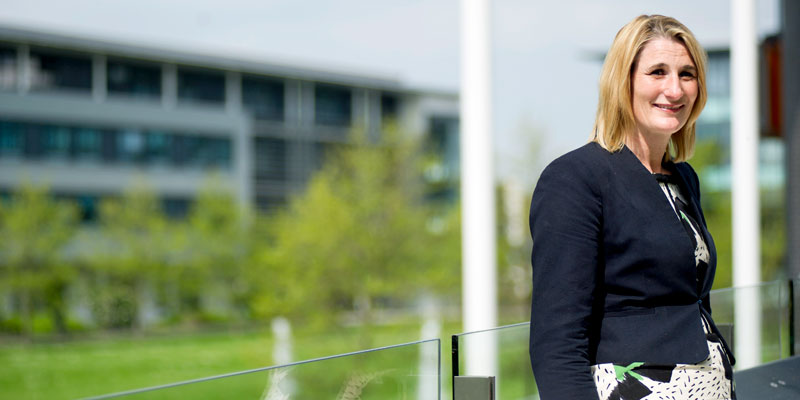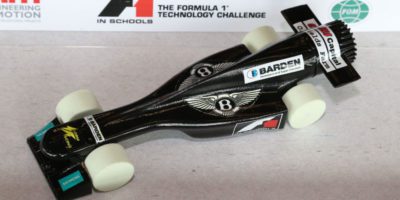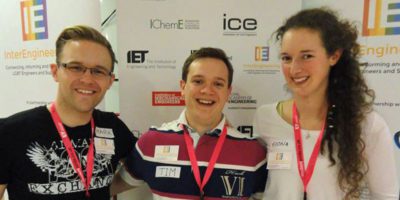Professor Jan Godsell joined WMG (Warwick Manufacturing Group) in October 2013 from Cranfield University School of Management, the next step in a career that has been split between both industry and academia. Beginning at ICI / Zeneca Pharmaceuticals and then working her way up to senior management level at Dyson, in both supply chain and operations management functions, Jan built a successful career in industry before moving into academia.

“…It’s about showing girls (and boys) the art of the possible… Perhaps there is something about people being too scared to try something, and it’s about how we can create the opportunities. This allows people to realise they like engineering in a much more emergent way. Using work placements in a much more strategic way is absolutely crucial…”
Engineering insight at 15
I went to an all-girls grammar school in Bexley Heath. I did maths, physics and chemistry at A level. I knew from about the age of 15 that I wanted to be an engineer, so in the sixth form I went on an insight course at Brunel University, which cemented my interest. I also started to apply for sponsorship with a range of different organisations: CarnaudMetalbox, ICI, and BICC – which was a local company. I was very fortunate to get an engineering sponsorship with ICI. That meant I took a pre-university year and moved up north to Huddersfield, which for somebody from the South East is a bit of an unusual place!
My pre-university year was just amazing. We did three months’ workshop training, a three month design and make project, and three months’ shadowing the different trades. At that time all the different trades were on site –everything from rubber covering, pipe lagging, to running a power house. I also did three months on an industrial engineering project.
During that time we had day-release to Huddersfield College to get a head start with our engineering skills. We learnt German and went on a European exchange to Bocholt in Germany. We also did time management training and mind mapping.
Incredibly enlightening: Life changing experience in Japan
When I went into university I had a scholarship worth about £3k a year, which was a lot of money 20 years ago. I did a four year engineering degree – a Master’s in Mechanical Engineering, Manufacture and Management with Japanese, at the University of Birmingham. ICI were very enlightened and they let us work abroad in a non-English speaking country of our choice for our first summer placement.
I was the first person who was allowed to go to Japan, because I was studying the language. It really sparked my interest in Japanese manufacturing to such an extent that I took an external third year and studied Japanese language at Nanzan University between my second and third year. That was a life-changing experience. Whilst I was out there I also managed to work for three months on a joint venture project between ICI and Teijin, building a new chemical plant, which was incredibly enlightening.
I also managed to do a premium placement for Shell Exploration and Production and spent three days on the Dunlin Alpha platform in the North Sea. I was very lucky that I went into my last year of university with two job offers – one from what was Zeneca (then the demerged part of ICI), and one from Shell. Choosing which job to take was a really tough decision, but for personal reasons and also for loyalty to ICI, I chose to stick with Zeneca.
I was a technical support engineer and then a production shift manager. I then got a job with Dyson because I wanted to move to the South West for personal reasons. I was with Dyson for four incredible years, where they sponsored me to do an MBA part time. The MBA was then my crossover into academia. I’ve been in academia for the last 15 years.
Helping children make better career choices at an early age

One of the constraints that we have in the UK system is that the A-level choices you need in order to do engineering are limited, and may be seen by some people as off putting. It might take some time to realise that maths and physics aren’t quite as scary as you think. But if you’re doing those sorts of A-levels anyway, then engineering is the most fantastic degree if you’re not sure what you want to do.
It could be seen as a bad thing, but only about 50% of people that do engineering degrees go on to do engineering as a career. Many of them go on to do accountancy, management consultancy, and a wide range of different things, because employers see the utility of an engineering degree in demonstrating that someone has excellent problem solving and logic skills.
So I would advocate that kids think about their choices as early as possible – whether it’s GCSEs or A-levels or a degree (not that they necessarily need a degree). There may be something very specific they want to do and that could narrow down their options, but there could be a slightly broader subject that could give them a wider range of options in the future.
I’d encourage people to think very carefully about not closing down their options too early on, particularly if they’re unsure about what they want to do, and to try to choose things that keep those options open.
Putting engineering degrees into context
I was very fortunate that sponsorship was around when I went to university. I would argue that to put an engineering degree into context you need to have some good work placements around it. I’d strongly advise all GCSE level students to consider doing an extended work placement. Schools encourage you to do one week placements, but people often use this as a tick box exercise where they get one of their parents to find somewhere that’s easy for them to go to.
Selex is a particularly good example of a company that offers an extended work placement. I first came across their scheme when I was judging the Institution of Mechanical Engineers Manufacturing Excellence Awards. It’s this real option value idea again. Rather than making people apply to do commercial, marketing or engineering placements, they offer a work placement that allows the young people to experience all the different aspects of the company for themselves. It’s only then that they make a decision about which one they find most interesting.
What Selex found as a result of that process is that they’ve increased the number of girls they have on their engineering apprenticeships so that there’s a 50/50 gender split, which I think is absolutely amazing.
There was a part of me that thought there was something in the argument about genetics – maybe it really is only about 10% of girls who want to be engineers? Maybe we shouldn’t make people do what they don’t want, maybe that’s just how it is, but the Selex scheme brought home to me that it just isn’t the case.
Showing girls (and boys) the art of the possible

It’s about showing girls (and boys) the art of the possible – to see finance, to see legal, to see marketing and to see engineering, and to see who chooses what. Perhaps there is something about people being too scared to try something, and it’s about how we can create the opportunities. This allows people to realise they like engineering in a much more emergent way. Using work placements in a much more strategic way is absolutely crucial.
I’d also say to young people that they don’t have to go to university. That probably sounds ironic coming from someone who now works for a university, and I’m probably showing my age, but only about 10% of people who left the all-girls grammar school I attended went on to university. Most of my friends went directly into jobs, and by the time we got into our mid-thirties we were all at very similar levels of seniority and responsibility.
Putting the practical side of engineering into context
I think we’d lost our way in terms of fully appreciating the value of a vocational career, and in something like engineering, where being able to put the practical side of it in context is so important, it is a career where you could take a more vocational route.
When I talk to managers in very senior operations management or engineering roles, many of them have come from engineering apprenticeships and come up via the HND-type route, and then done a degree on a part time basis. There are huge merits in doing that, particularly at the moment where there’s so much pressure on students around student debt. Thinking again in terms of real option value, the money saved in terms of student debt could potentially help towards a deposit for a house, which is another big challenge for young people these days.
Equally, there are more choices today for people who want to take the university route. WMG now has its Applied Engineering Programme, where rather than just doing a standard undergraduate degree, you could join employers like Jaguar Land Rover as an advanced apprentice and they can support you to do your degree as part of the programme. This is another way of blending technical and academic skills, and it’s another pathway.
A move back towards a pathways approach
It’s great that we’re moving back towards a pathways approach, because different pathways suit different individuals. Dawn Bonfield, Chief Executive of the Women’s Engineering Society, came to Warwick recently. One of the things she said that resonated with me was the recognition that the ‘classic’ route into engineering with physics / maths type A levels, before going straight on to an engineering course, precludes some girls who may think they’re not good at those subjects.
I wonder if one of the ways we could increase the number of girls going into engineering and its many different specialisations, is to be more open about the pathways in. You may come in at a slightly more mature age, or it could just be thinking about different entry points. Maths is obviously very important, but there are different ways to learn it.
Skills-based approach
Design, for example, can have a huge engineering content, but it’s much more artistically based, so, for example, do you have to have a maths qualification to be good at design? Maybe it’s about being less functional about it, and thinking about it more in terms of career paths and the skills that you need for a particular job, as opposed to just thinking that you need a particular qualification.
If you were to ask most engineers how much of their engineering degree they’ve used in their day to day job, I’m not sure the percentage would be particularly high. It’s more about the underlying skills that it helps you develop – your problem solving and logic.
When I joined Zeneca as a technical support engineer my passion was for manufacturing, and after about a year a job came up as a shift manager in exactly the same area where I was working. My manager at the time advised me not to apply for the job because she said I would be downgrading my skills to go from engineering to manufacturing. These sorts of these delineations aren’t helpful either.
I’ve always been passionate about manufacturing. I knew the best way to support my route into manufacturing was to have a degree. It could be argued that I should have done a manufacturing engineering degree, but this is where my competitive spirit comes in – because the grades needed were lower than I needed for a mechanical engineering degree, and I wanted to have the best degree I possibly could, I applied for what I believed to be all the top engineering programmes. This was because I thought they gave me more options.
One point in a network that spans the world
So I went from engineering to manufacturing, and when I was working in manufacturing I realised a factory is just one point in a network that doesn’t just span the UK – it spans the world. So that got me into the exciting world of supply chain, and I believe it’s because I have this broader view of manufacturing in the context of a global network of supply chains that I was asked by the Department for Business, Innovation & Skills (BIS) to be part of their Manufacturing Advisory Group.
In order for us to envisage the manufacturing of the future, we need to think of the role that the UK plays as part of this network of supply chains.
Empowering consumers through education about the supply chain

There’s been some debate before about whether promotions such as buy-one-get-one-free are a good thing or not. These are the types of questions we’d like to raise through the MOOC, so consumers could choose to change their shopping habits if they know that by doing that they’re supporting farmers and producers up and down that chain. It’s those things we take for granted; we turn on our tap and there’s water, we go to our fridge and we have milk. We’re used to it so we don’t think too much about what goes on behind it. I’d like to change that.
http://www2.warwick.ac.uk/fac/sci/wmg/about/careers/workinginstem/staffprofiles/jangodsell
http://www.wmgshapingthefuture.co.uk/author/jan-godsell/
https://twitter.com/jangodsell





